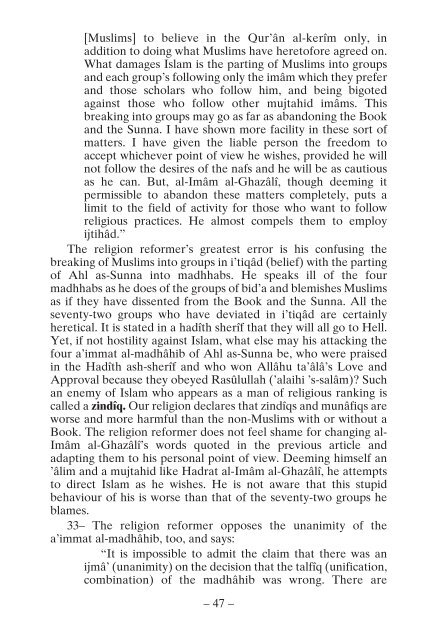Answer to an Enemy of Islam
Answer to an Enemy of Islam This is a refutation of the lies and slanders which the lâ-madhhabî Rashîd Rıdâ of Egypt, who appeared in the disguise of a religious man and wrote against the scholars of Islam in his book Muhâwarât.
Answer to an Enemy of Islam
This is a refutation of the lies and slanders which the lâ-madhhabî Rashîd Rıdâ of Egypt, who appeared in the disguise of a religious man and wrote against the scholars of Islam in his book Muhâwarât.
Create successful ePaper yourself
Turn your PDF publications into a flip-book with our unique Google optimized e-Paper software.
[Muslims] <strong>to</strong> believe in the Qur’ân al-kerîm only, in<br />
addition <strong>to</strong> doing what Muslims have here<strong>to</strong>fore agreed on.<br />
What damages <strong>Islam</strong> is the parting <strong>of</strong> Muslims in<strong>to</strong> groups<br />
<strong>an</strong>d each group’s following only the imâm which they prefer<br />
<strong>an</strong>d those scholars who follow him, <strong>an</strong>d being bigoted<br />
against those who follow other mujtahid imâms. This<br />
breaking in<strong>to</strong> groups may go as far as ab<strong>an</strong>doning the Book<br />
<strong>an</strong>d the Sunna. I have shown more facility in these sort <strong>of</strong><br />
matters. I have given the liable person the freedom <strong>to</strong><br />
accept whichever point <strong>of</strong> view he wishes, provided he will<br />
not follow the desires <strong>of</strong> the nafs <strong>an</strong>d he will be as cautious<br />
as he c<strong>an</strong>. But, al-Imâm al-Ghazâlî, though deeming it<br />
permissible <strong>to</strong> ab<strong>an</strong>don these matters completely, puts a<br />
limit <strong>to</strong> the field <strong>of</strong> activity for those who w<strong>an</strong>t <strong>to</strong> follow<br />
religious practices. He almost compels them <strong>to</strong> employ<br />
ijtihâd.”<br />
The religion reformer’s greatest error is his confusing the<br />
breaking <strong>of</strong> Muslims in<strong>to</strong> groups in i’tiqâd (belief) with the parting<br />
<strong>of</strong> Ahl as-Sunna in<strong>to</strong> madhhabs. He speaks ill <strong>of</strong> the four<br />
madhhabs as he does <strong>of</strong> the groups <strong>of</strong> bid’a <strong>an</strong>d blemishes Muslims<br />
as if they have dissented from the Book <strong>an</strong>d the Sunna. All the<br />
seventy-two groups who have deviated in i’tiqâd are certainly<br />
heretical. It is stated in a hadîth sherîf that they will all go <strong>to</strong> Hell.<br />
Yet, if not hostility against <strong>Islam</strong>, what else may his attacking the<br />
four a’immat al-madhâhib <strong>of</strong> Ahl as-Sunna be, who were praised<br />
in the Hadîth ash-sherîf <strong>an</strong>d who won Allâhu ta’âlâ’s Love <strong>an</strong>d<br />
Approval because they obeyed Rasûlullah (’alaihi ’s-salâm)? Such<br />
<strong>an</strong> enemy <strong>of</strong> <strong>Islam</strong> who appears as a m<strong>an</strong> <strong>of</strong> religious r<strong>an</strong>king is<br />
called a zindîq. Our religion declares that zindîqs <strong>an</strong>d munâfiqs are<br />
worse <strong>an</strong>d more harmful th<strong>an</strong> the non-Muslims with or without a<br />
Book. The religion reformer does not feel shame for ch<strong>an</strong>ging al-<br />
Imâm al-Ghazâlî’s words quoted in the previous article <strong>an</strong>d<br />
adapting them <strong>to</strong> his personal point <strong>of</strong> view. Deeming himself <strong>an</strong><br />
’âlim <strong>an</strong>d a mujtahid like Hadrat al-Imâm al-Ghazâlî, he attempts<br />
<strong>to</strong> direct <strong>Islam</strong> as he wishes. He is not aware that this stupid<br />
behaviour <strong>of</strong> his is worse th<strong>an</strong> that <strong>of</strong> the seventy-two groups he<br />
blames.<br />
33– The religion reformer opposes the un<strong>an</strong>imity <strong>of</strong> the<br />
a’immat al-madhâhib, <strong>to</strong>o, <strong>an</strong>d says:<br />
“It is impossible <strong>to</strong> admit the claim that there was <strong>an</strong><br />
ijmâ’ (un<strong>an</strong>imity) on the decision that the talfîq (unification,<br />
combination) <strong>of</strong> the madhâhib was wrong. There are<br />
– 47 –

















